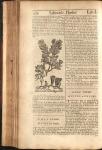 This chapter hasn't been proofread yet.
This chapter hasn't been proofread yet.
I. The Names. It is called in Greek, K_V^ X AtfcvuU ' In Latin, Cistus mas : And in English, Male Cistus, Sage Rose, and Holly Rose, as Gerard calls it.
II. The Kinds. It is either Male, of which in this Chapter: Or, Female, of which in the next. Parkinson makes four several kinds thereof, of which the first of them, viz. Cistus man, or Male Cistus, is the chief which grows with us.
III. The Description. It has a woody Root, and will abide some years with us, if care be taken to keep it from the extremity of our cold Winters,-which it will scarcely endure. From this Root grows up a shrubby Plant, about a yard or more high, having many slender, brittle, woody Branches, covered with a whitish Bark ; on which erow many whitish green Leaves, long, and something narrow, crumpled, or wrinkled, as it were, with Veins, and somewhat hard in handling, especially the older Leaves, for the voting ones are fitter, something like unto
our Sage Leaves, for the form and color, but much smaller, two always set together at a Joint. The plowers β and at the tops of the Branches, three or four together, upon several tender Footstalks, consisting of free (mall round Leaves apiece, somewhat like unto a small single Rose, or the Rose of the Wild Bryar, of a fine reddish purple color, with many yellow threads in the middle, without any Smell at all, and quickly fading or failing away, abiding seldom one whole day blown at most : when the Flowers are past, there come up round hard hairy Heads in their places, containing within them, small brownish Seed.
IV. The Places. It naturally grows in Italy, Spain, Portugal, and Prance, and other hot and Southern Countries: but with us it is only nourished up in Gardens.
V. The Times. In its Native places, it Flowers generally in May : but with us about the latter end of June, also in July and August _·, and the Seed is ripe quickly after.
VI. As to its Qualities, Specification, Preparations and Virtues, they are the same in all respect with those of the Dwarf Cifi/x, to which I refer you.
Botanologia, or The English Herbal, was written by William Salmon, M.D., in 1710.

 Page 223
Page 223 Page 224
Page 224